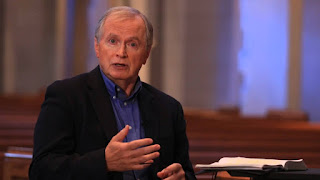Yesterday I shared that I saw John 11:1 – 44 as a model for prayer. The major take away being that we need to be praying for God to be glorified in all that we pray. This afternoon I was reading in D. A. Carson’s book,
Praying with Paul: A Call to Spiritual Reformation
. Working through Philippians he came up with the same observation. He says it better than I and is worth quoting in whole (by the way I highly recommend the book):
 |
| D. A. Carson |
The Goal of Paul’s Prayer
“We pray this so that the name of our Lord Jesus may be glorified in you, and you in him” (1:12). Having listed his petitions, Paul now discloses the two-part goal of such prayers.
1. Paul seeks the glorification of the Lord Jesus. This first part is common enough: “We pray this so that the name of our Lord Jesus may be glorified in you.” For Paul, his concern that Christians might be counted worthy of their calling, and his deep desire that God might fulfill their good, faith-prompted purposes, can never be ultimate ends. True, they are valued ends, things deeply to be desired, things to be prayed for. Yet they are only proximate ends; the ultimate end is that the Lord Jesus be glorified in consequence of such growing maturity and fruitfulness on the part of believers.
The Christian’s whole desire, at its best and highest, is that Jesus Christ be praised. It is always a wretched bastardization of our goals when we want to win glory for ourselves instead of for him. When we arrange flowers in the church, or serve as an usher, or preach a sermon; when we visit the sick, or run a youth group, or attend prayer meeting—when we do any of these things, and more, with the secret desire that we might be praised for our godliness and service, we have corrupted the salvation we enjoy. Its purpose is to reconcile us to God, for God must be the center of our lives, the ground and the goal of our existence. Indeed, Christ himself, the agent of God in creation, is the one of whom Paul elsewhere declares that all things were made by him and for him (Col. 1:16). Lying at the heart of all sin is the desire to be the center, to be like God. So if we take on Christian service, and think of such service as the vehicle that will make us central, we have paganized Christian service; we have domesticated Christian living and set it to servitude in a pagan cause.
Our pilgrimage as Christians need not be very far advanced before we ruefully recognize that even our best service, motivated by the highest zeal, is regularly laced with large doses of vulgar self-interest. We learn that these sins, too, we must confess and seek to overcome. Paul recognizes the problem, and articulates the proper goal in his prayer: “We pray this,” he writes, not that you may be thought remarkable Christians, or so that you may gain a reputation for perseverance and spirituality and power throughout the Roman Empire, but “so that the name of our Lord Jesus may be glorified in you.”
D. A. Carson, A Call to Spiritual Reformation: Priorities from Paul and His Prayers (Grand Rapids, MI: Baker Book House, 1992), 57–58.
Good stuff, get the book. The second point is the glorification of believers.
 . Working through Philippians he came up with the same observation. He says it better than I and is worth quoting in whole (by the way I highly recommend the book):
. Working through Philippians he came up with the same observation. He says it better than I and is worth quoting in whole (by the way I highly recommend the book):
No comments:
Post a Comment